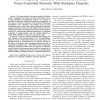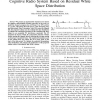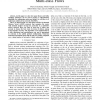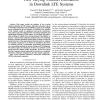127
Voted
PIMRC
2010
IEEE
15 years 17 days ago
2010
IEEE
This study addresses the general problem of efficient resource management in wireless networks with arbitrary timevarying topologies. Communication channels are assumed to generall...
131
Voted
PIMRC
2010
IEEE
15 years 17 days ago
2010
IEEE
Abstract--This paper addresses the fairness of Medium Access Control (MAC) protocols that are capable of handling interference on the physical layer to a varying extent. The variat...
91
Voted
PIMRC
2010
IEEE
15 years 17 days ago
2010
IEEE
138
Voted
PIMRC
2010
IEEE
15 years 17 days ago
2010
IEEE
We propose an opportunistic channel access scheme for cognitive radio-enabled secondary networks. In our work, we model the channel occupancy due to Primary User (PU) activity as a...
132
Voted
PIMRC
2010
IEEE
15 years 17 days ago
2010
IEEE
This paper proposes the utilization of GSM logical channels (RACH, AGCH and TCH) and UMTS signaling (MIB and SIBs) of the Broadcast Channel to transmit a Cognitive Beacon Channel (...
146
Voted
PIMRC
2010
IEEE
15 years 17 days ago
2010
IEEE
In this paper we show how game theory and Gibbs sampling techniques can be used to design a self-optimizing algorithm for minimizing end-to-end delays for all flows in a multi-clas...
121
Voted
PIMRC
2010
IEEE
15 years 17 days ago
2010
IEEE
This paper tackles the problem of fast varying channel estimation in LTE systems. Particular attention is given to downlink transmission where OFDMA is used as the multiple access ...
140
click to vote
PIMRC
2010
IEEE
15 years 17 days ago
2010
IEEE
Despite all the encouraging reports on the benefit of Partially Overlapped Channels (POCs), the relative simple interference models and rather arbitrary network settings considered...
111
Voted
PIMRC
2010
IEEE
15 years 17 days ago
2010
IEEE
In this paper, the generation of 16-QAM and 64-QAM space-time trellis codes (STTCs) for several transmit antennas is considered. The main problem with an exhaustive search is the i...
140
Voted
PIMRC
2010
IEEE
15 years 17 days ago
2010
IEEE
Abstract-- Due to the limited energy supplies of nodes in wireless networks, achieving energy efficiency is crucial for extending the lifetime of these networks. Thus, we study eff...




